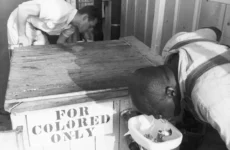Please click the link below to subscribe to a FREE PDF version of each print edition of the Niagara Reporter
http://eepurl.com/dnsYM9

By: Staff Reporter
Events are coming to a head in the Marcellus Overton sex trafficking case, as the defense and prosecutors argue whether the barbershop owner in Niagara Falls will be permitted to withdraw his guilty plea.
Facing up to life in prison on sex trafficking and transporting a minor, Overton took a plea deal that could land him in prison for 9 years.
The decision of whether to allow him to withdraw his plea is in the hands of Judge William M. Skretny, in the United States District Court for the Western District of New York.
The motion to withdraw Overton’s plea came after the delayed release by the prosecution of evidence that might show he is innocent.
One of the alleged victims, the key witness against Overton, made a statement to a federal agent where she claimed Overton was innocent.
The prosecution hid this information from Overton.
The case seems to center around a trip Overton made to Georgia with three friends.
One of them, the key witness, who was 17 at the time, had been working as a sex worker and placed an online ad offering her services.
Overton claims he did not know about the young lady’s plans to earn extra money on the trip. In fact she never actually hooked up with any man or earned any money.
When she was questioned, she told federal agents it was her idea, solely, to try to earn some cash by placing the ad.
The government never told this to Overton and instead told his defense that the 17 year old would testify against him, making him culpable for transporting her, a minor, across state lines for the purpose of trafficking her.
In other words, a possible life sentence.
Rather than share the important information that the young lady told the federal agent, the prosecutors simply took the agent off the case.
Overton makes the argument that he was essentially tricked into pleading guilty after being charged with “sex trafficking of a minor and transportation of a minor to engage in criminal sexual activity”.
——
Overton’s lawyer, Frank LoTempio, III, wrote in the defense motion seeking to withdraw the pleas: “The Defendant stated in his declaration that he would not have taken the plea had he been in possession of the evidence…”
The prosecution however does not want to allow Overton to withdraw his plea. They want him sentenced right away and sent to prison, by holding him to the old plea deal.
Part of the prosecution’s argument is that the young woman lied when she first talked to a federal agent. After they brought the frightened young lady to the Grand Jury [possibly threatening her with charges] she changed her mind and “told the truth.”
The prosecution wrote, “statements made by Witness 3 to law enforcement [were made] at a time when Witness 3 was still in contact with the defendant. She later contradicted the statements in her grand jury testimony, confirming the defendant’s conduct.”
That may be the case, but “Victim 3” is the cornerstone for the prosecution’s case. If she has told two different stories – that strikes at the core of reasonable doubt. There is a good chance that if Overton goes to trial he will be acquitted.
No wonder prosecutors from the Department of Justice are not overly eager to see justice done.
They opposed the motion saying “A guilty plea is no mere formality, but a ‘grave and solemn act.’(…) Society has a strong interest in the finality of guilt pleas…”
Of course society has a far stronger interest in justice being served and not to place an innocent man in prison.
The Defense argued: “All evidence shows that Marcellus Overton always protested his innocence, and wanted to go to trial even without the … [hidden] evidence [that shows he might be innocent]. The Defendant went to the eve of trial before succumbing to the pressure of taking a plea”.
Furthermore, as the defense motion reminds us, Federal Rule 32 is clear: “A guilty plea is not knowingly and voluntarily made when the Defendant has been misinformed as to crucial aspects of their case”.
The defense is calling out the prosecutors in their misrepresenting of the importance of “Victim 3” to their case, a woman who has – let’s repeat – made a statement to law enforcement saying Overton was innocent.
The Defense wrote, “The statement [Victim 3] made to a case agent is relevant, especially if it undermines their theory of the case and also undermines her credibility….
“Further, [if the prosecution had given Overton the true information about her original statement] Witness 3 […] could have been a witness for the defense…
“The Government is attempting to prove that Mr. Overton was a pimp. Yet, they have a witness who rebuts their theory.”
——
In a reasonable world, there should be no discussing Overton’s right to withdraw his plea. It would not mean he would walk free. It would only mean the government would have to actually prove their case against a man who seven years ago took a drive down to Georgia on what he claims was a short trip with three friends.
There was, by the way, apparently no actual sex work done by the young lady, Victim #3. or the other two women. They merely placed an online ad making this a sex trafficking case without any sex.
Based on what was withheld from him, Overton believes he should be permitted to go to trial and let a jury decide if he is innocent or guilty.




















